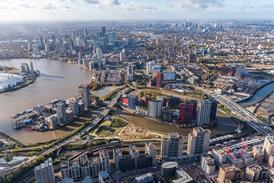The Landscape Institute is calling for a pragmatic and integrated skills policy to grow the economy and tackle emergencies in climate, nature, health and housing, writes Ian Phillips

As we approach the forthcoming general election, the UK faces multiple, interrelated crises – from climate and nature emergencies to public health, wellbeing and housing.
As part of an integrated policy platform that treats these challenges as connected, the next government must focus on addressing the green skills shortage. The skills of landscape professionals are essential for the planning, design and management of a greener, more sustainable built environment – but policy to enable these skills to make a difference on the climate and biodiversity emergencies, and contribute to the economy, is lacking. This is why driving education and green skills are a central tenet of the Landscape Institute’s (LI) recommendations to the next UK government, alongside scaling up climate resilient, low carbon development, promoting a combined approach to environmental policy, and championing the power of nature for health and wellbeing.
The landscape industry is very much in demand. Landscape Institute (LI) research shows that it contributes £24.6bn to the UK economy in Gross Value Added (GVA) and employs 333,900 people in 49,300 businesses. It is an internationally recognised sector, with professionals undertaking essential work in conserving, planning and revitalising urban and rural landscapes.
However, the landscape industry, like many other sectors, faces chronic skills shortages at professional levels, which threaten its future growth and success. The LI research shows 50% of businesses reported a hard to fill vacancy in 2022 and labour shortages were estimated at 22% in 2009. This is a position that has continued to worsen in recent years.
There is no short-term solution to resolve the skills and employment shortage. A full-time Landscape Architect (LA) course takes a minimum of three years, often supplemented by an additional year of work experience. To achieve chartered status requires further studies and work experience up to Master’s level, typically taking another three years after degree qualification.
The LI and wider industry are doing much to encourage the development of home-grown talent, and to promote landscape as a valued and rewarding career. However, the reality is that industry skills shortages will only be alleviated through a flexible, responsive immigration system, which grants study and work visas to overseas candidates, as per the Graduate Visa and Skilled Worker visa schemes.
The landscape shortage was previously recognised through the inclusion of Landscape Architects (LAs) on the Shortage Occupation List in 2019. LAs were included under the Architect umbrella despite clear and significant differences between the professional skills involved. However, in spite of a decline in LA numbers since 2019, the profession remains under the Architect heading and has been removed from the new Immigration Salary List (ISL). This can only exacerbate the LA sector’s skills and employment issues.
Overseas student fees subsidise and ensure the viability of many courses, including landscape-related ones
The substantial increase in the going rate to £45,900 for a Skilled Worker visa (standard rate) has made it untenable for businesses to sponsor overseas graduates, or even recently Chartered Landscape Architects. This represents approximately 175% of previous salary levels applicable to a landscape architect and cannot be recouped commercially.
Such rates would only be viable for senior level roles. However, those roles are not the ones where recruitment from overseas is most likely and advantageous. Training is required to adjust to UK landscape and environmental planning policy and design regulations, which is more economically and practically achieved at a graduate level (within a few years of degree qualification). Furthermore, senior post-holders are probably settled in businesses, may have families and are less likely to move for a UK job. In addition, the previously applicable 20% salary ‘discount’ is no longer available for Landscape Architects.
A restriction of overseas graduate visas would further worsen the skills shortage and also jeopardise the viability of university courses. If overseas students are unable to gain post-degree employment in the UK, they will be less likely to apply to UK universities. This will reduce the skills pipeline and will damage the university sector financially. Overseas student fees subsidise and ensure the viability of many courses, including landscape-related ones.
A drop in fee income and students will lead to the termination of courses, especially those which are already under threat of closure, and create a downward spiral of skilled landscape resources. This will further damage the landscape sector economically. Reduced overseas student numbers cannot be compensated by home students in the coming years, especially if relevant courses are closed. This would then have long-term implications on the success of the UK landscape sector at all skills levels.
As a result of tightening recruitment controls for overseas graduates and skilled workers, UK companies have had to turn down business contracts. This cannot be in the UK’s interests from an environmental or economic perspective.
Attuning the Immigration Salary List and visa criteria to alleviate skills shortages would quickly reap tangible employment and sector commercial success benefits. This should be a first step as part of a long-term plan to develop the green skills we need to decarbonise, boost biodiversity within the built environment, and foster a healthy, sustainable economy.
The Landscape Institute welcomes discussion on this critical issue both in the run up to the election, and after the next government arrives in office. Get in touch at policy@landscapeinstitute.org.
Postscript
Ian Phillips is chair of the Landscape Institute’s policy and communications committee
















2 Readers' comments